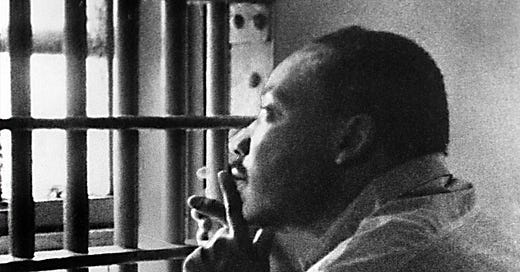The Letter from White Clergymen that Prompted MLK's "Letter from a Birmingham Jail"
Read the original letter from white moderates who tried to admonish King for his activism.
If I could spend most of my time researching history and writing about it in this newsletter, I think I’d be close to fulfilling my purpose in life. That can only happen if I have your support. Would you consider becoming a paid subscriber today?
Perhaps you have heard of Martin Luther King, Jr.’s famous “Letter from a Birminghal Jail.” It is one of the greatest works of political theology in the 20th century.
In it, King articulates the rationale for direct-action nonviolence. He wrote, “Nonviolent direct action seeks to create such a crisis and foster such a tension that a community which has constantly refused to negotiate is forced to confront the issue.”
He went on to express his deep disappointment with the white religious community. He told them, “I came to Birmingham with the hope that the white religious leadership of this community would see the justice of our cause and, with deep moral concern, would serve as the channel through which our just grievances could reach the power structure. I had hoped that each of you would understand. But again I have been disappointed.”
King’s “Letter from a Birmingham Jail” deserves frequent revisiting, at least annually. But have you read the letter that prompted King’s response?
Eight white clergymen of Birmingham, including Baptists, Methodists, a Presbyterian and Rabbi, wrote to King and urged patience and moderation.
He dubbed such people the “white moderate.”
Imagine King, unjustly imprisoned for marching in support of Black civil rights and desegregation, reading this letter. Those on the front lines of the struggle for justice rightly exhibit little patience for those who urge patience.
Below is a full transcript of the letter from white clergymen to Martin Luther King, Jr.
April 12, 1963
We the undersigned clergymen are among those who in January, issued "An Appeal for Law and Order and Common Sense," in dealing with racial problems in Alabama. We expressed understanding that honest convictions in racial matters could properly be pursued in the courts but urged that decisions of those courts should in the meantime be peacefully obeyed.
Since that time there had been some evidence of increased forbearance and a willingness to face facts. Responsible citizens have undertaken to work on various problems which caused racial friction and unrest. In Birmingham, recent public events have given indication that we all have opportunity for a new constructive and realistic approach to racial problems.
However, we are now confronted by a series of demonstrations by some of our Negro citizens directed and led in part by outsiders. We recognize the natural impatience of people who feel that their hopes are slow in being realized. But we are convinced that these demonstrations are unwise and untimely.
We agree rather with certain local Negro leadership which has called for honest and open negotiation of racial issues in our area. And we believe this kind of facing of issues can best be accomplished by citizens of our own metropolitan area white and Negro, meeting with their knowledge and experience of the local situation. All of us need to face that responsibility and find proper channels for its accomplishment.
Just as we formerly pointed out that "hatred and violence have no sanction in our religious and political tradition." We also point out that such actions as incite to hatred and violence, however technically peaceful those actions may be, have not contributed to the resolution of our local problems. We do not believe that these days of new hope are days when extreme measures are justified in Birmingham.
We commend the community as a whole and the local news media and law enforcement officials in particular, on the calm manner in which these demonstrations have been handled. We urge the public to continue to show restraint should the demonstrations continue, and the law enforcement officials to remain calm and continue to protect our city from violence.
We further strongly urge our own Negro community to withdraw support from these demonstrations, and to unite locally in working peacefully for a better Birmingham. When rights are consistently denied, a cause should be pressed in the courts and in negotiations among local leaders, and not in the streets. We appeal to both our white and Negro citizenry to observe the principles of law and order and common sense.
Signed by:
C. C. J. CARPENTER, D.D., LL.D. Bishop of Alabama
JOSEPH A. DURICK, D.D. Auxiliary Bishop. Diocese of Mobile-Birmingham
Rabbi HILTON J. GRAFMAN, Temple Emmanu-El, Birmingham,
Alabama Bishop PAUL HARDIN, Bishop of the Alabama-West Florida Conference of the Methodist Church.
Bishop HOLAN B. HARMON, Bishop of the North Alabama Conference of the Methodist Church
GEORGE M. MURRAY, Bishop Coadjutor, Episcopal Diocese of Alabama
EDWARD V. RAMAGE, Moderator, Synod of the Alabama Presbyterian Church in the United States
EARL STALLINGS, Pastor, First Baptist Church, Birmingham, Alabama.





Thank you for sharing this transcript letter, Dr Tisby. It’s sobering to say the least but helps give context to Reverend Dr King’s profoundly moving response. When the “religious” authorities in our midst call for patience and an orderly response from the marginalized, suffering, victims of injustice and racism while waiting for this white world to make “their decision” on an acceptable solution, I can’t help but see Jesus in all his glory, authority and power taking a stand and FLIPPING TABLES! Time to be THAT Jesus in our world!
Thanks for posting. It is surprisingly hard to track down this document.